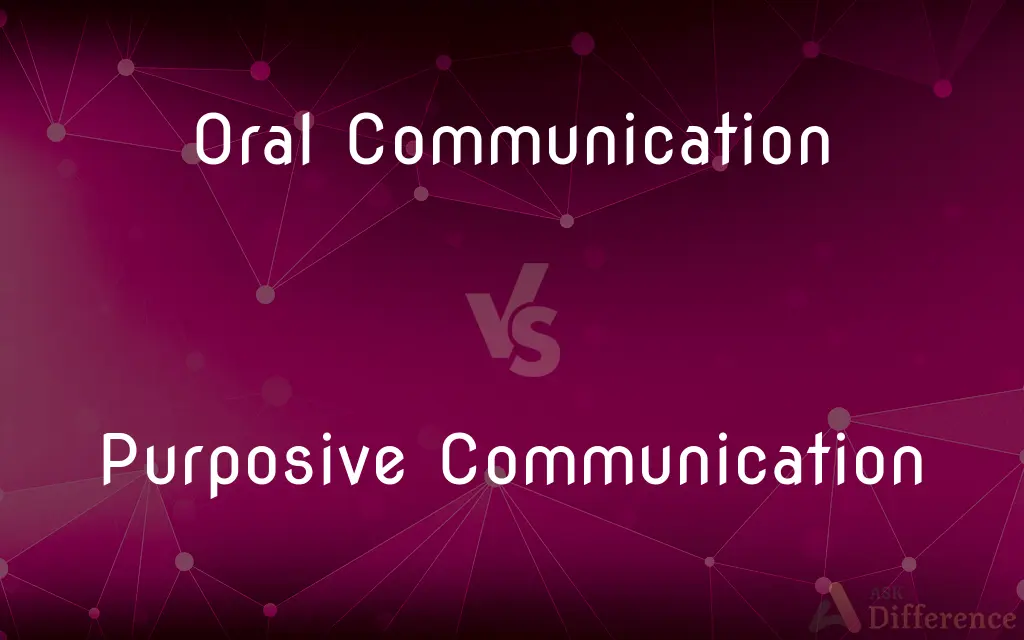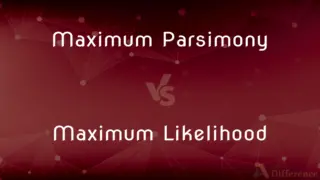Oral Communication vs. Purposive Communication — What's the Difference?
By Tayyaba Rehman — Published on October 30, 2023
Oral communication entails spoken interactions. Purposive communication involves intentional, goal-driven messages, regardless of medium.

Difference Between Oral Communication and Purposive Communication
Table of Contents
ADVERTISEMENT
Key Differences
Oral communication implies any information exchange using spoken words. Purposive communication refers to communication with a clear intention, aiming to achieve a specific goal or result. The difference in definitions implies a distinct separation where oral communication is a medium and purposive communication is driven by intent.
Oral communication can be informal and spontaneous, seen in casual dialogues. Purposive communication, irrespective of being oral, written, or non-verbal, always carries a definite objective, being thought-out and often carefully structured to achieve the desired impact or outcome.
In oral communication, feedback is usually immediate and direct, facilitating swift adjustments to the communicative approach. Purposive communication might encompass an array of strategies to ensure that the message not only conveys the intention but also prompts the desired action or response from the recipient.
Oral communication skills are vital for spontaneous and interactive communication in various contexts. Purposive communication skills entail the strategic and mindful formulation of messages to serve particular, often pragmatic, goals, with effectiveness being measured by how well the intended outcomes are achieved.
Examples of oral communication might include a chat with friends or an impromptu meeting. Contrastingly, purposive communication could be seen in advertising, persuasive speeches, or deliberate messaging aimed at invoking specific reactions or responses in the audience.
ADVERTISEMENT
Comparison Chart
Grammar Role
"Oral Communication" is an adjective-noun pair.
"Purposive Communication" is also an adjective-noun pair.
Plural Form
Oral communications can be multifaceted.
Purposive communications are targeted.
Definite Article Usage
The oral communication was clear.
The purposive communication was effective.
Indefinite Article Usage
An oral communication may be informal.
A purposive communication must be strategic.
In a Sentence
We engage in oral communication daily.
Marketing uses purposive communication extensively.
Compare with Definitions
Oral Communication
It requires good listening skills for effective engagement.
Through oral communication, they resolved the conflict amicably.
Purposive Communication
It involves strategic formulation of messages to achieve desired outcomes.
Her purposive communication in the proposal secured the project.
Oral Communication
Oral communication involves transmitting information using spoken words.
Oral communication was key in the lively debate.
Purposive Communication
Purposive communication is crafted with a specific intention or goal in mind.
The advertisement is a form of purposive communication aiming to boost sales.
Oral Communication
It can be formal, like speeches, or informal, like conversations.
His oral communication at the conference was impeccable.
Purposive Communication
Purposive communication can be executed through various mediums.
The email campaign was a purposive communication to gain subscribers.
Oral Communication
Oral communication can be interactive and dynamically adjusted.
During oral communication, they clarified doubts on the spot.
Purposive Communication
It often involves a level of persuasion or influence on the recipient.
Through purposive communication, he swayed the team's opinion.
Oral Communication
It allows immediate feedback and direct interaction between participants.
In oral communication, misinterpretations can be promptly addressed.
Purposive Communication
Purposive communication seeks to elicit a specific response or action.
The purposive communication in the announcement aimed to ensure compliance.
Common Curiosities
What is the primary goal of purposive communication?
Purposive communication aims to convey a message with a specific intention or outcome in mind.
What skills enhance oral communication?
Effective speaking, active listening, and non-verbal cues enhance oral communication.
Can oral communication be non-verbal?
No, oral communication specifically involves spoken words and sounds.
Is feedback important in oral communication?
Yes, feedback in oral communication allows for immediate adjustments and ensures clarity.
What does oral communication involve?
Oral communication involves exchanging information through spoken words.
Does purposive communication always involve direct interaction?
No, purposive communication may not always involve direct interaction and can be one-way.
Can purposive communication be unintentional?
No, by definition, purposive communication is always intentional and goal-oriented.
Is purposive communication always oral?
No, purposive communication can be oral, written, or non-verbal, as long as it has a clear intent.
How is effectiveness measured in purposive communication?
Effectiveness in purposive communication is measured by its ability to achieve the intended goal.
Is oral communication only face-to-face?
No, oral communication can also be through phone calls, virtual meetings, and voice notes.
Can oral communication be planned and strategic?
Yes, oral communication can be both spontaneous and carefully planned.
Can purposive communication be informal?
Yes, purposive communication can be informal if the intent and desired response are clear.
How is oral communication used in everyday life?
Oral communication is used in conversations, discussions, phone calls, and various other spoken exchanges.
How do cultural differences affect oral communication?
Cultural differences can influence language use, non-verbal cues, and etiquette in oral communication.
In what sectors is purposive communication prominently used?
Purposive communication is widely used in advertising, marketing, public relations, and leadership roles.
Share Your Discovery

Previous Comparison
Maximum Parsimony vs. Maximum Likelihood
Next Comparison
Job Enlargement vs. Job EnrichmentAuthor Spotlight
Written by
Tayyaba RehmanTayyaba Rehman is a distinguished writer, currently serving as a primary contributor to askdifference.com. As a researcher in semantics and etymology, Tayyaba's passion for the complexity of languages and their distinctions has found a perfect home on the platform. Tayyaba delves into the intricacies of language, distinguishing between commonly confused words and phrases, thereby providing clarity for readers worldwide.












































